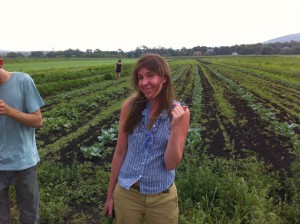Fast food may be a defining characteristic of our contemporary culture, but competition is brewing. The Slow Food Movement is hoping to change the trend towards the globalization of agricultural products with an emphasis on traditional and regional cuisine as well as the empowerment of small, independent farmers. Cecila Estreich is one member of a growing generation of young people looking for ways to empower the slow food industry and local farming practices. She speaks here with Women Of Green staff writer Jason-Louise Graham about her lessons from the field and the need for efficient systems of distribution.
How did you become involved with the local farming and slow food movement?
My interest in food began as a fascination with esoteric cookbooks. It was in 2007 however, that I got up close and personal with the food industry. Alongside my internship at Slow Food USA I enrolled as a graduate student in the New York University Food Studies program. There I felt that the theoretical information we were taught missed many of the points the slow food industry was going through in reality. The struggle of these farmers really hit home at the upstate New York goat cheese farm Consider Bradwell, where I worked for several months in 2008. Although these dairy farmers, who aimed to push for the maintenance of fair, locally grown and organic cheese products, worked day and night to reach productivity, they remained inefficient, struggling to have their total sales cover their cost of production.
What was missing? Why couldn’t they compete with larger farms?
It’s a known fact that small farmers have to deal with corporate control of food supplies at the most basic levels, from the dominance and subsidization of only a few crops, to controlling criteria for food production and distribution methods and branding. Farmers competing against multi-billion dollar food corporations seem to be at an endless disadvantage.
How did this make you feel about the food industry?
I felt compelled to contribute, and to help not only the system I wish to see thrive, but also the farmers I saw struggling. What I learned at Basis is that small farmers lack opportunities to scale up the market because they cannot commit any time to the administrative tasks required to do so. They need proper administration like marketing and sales reps but especially efficient distributors that make the ‘local’ concept as effective in reaching consumers as mass-distribution.
What do you mean by ‘especially distribution’?
Through my experience in slow food distribution, I’ve learned that slow food and local farming not only provide alternative business models, but also that they demonstrate a very high and ever increasing demand. At the same time, as demand grows, it becomes increasingly difficult for slow food distributors (as such a small niche) to remain efficient without the proper reliable legal and functional structural support. It is crucial that schemes of best practice and standard are developed, whereby warehouse spaces could become subsidized, truck routes streamlined (helping drivers navigate more easily through busy cities), big investors could receive tax breaks to create more incentive and small business could receive a certain amount of financial help to keep their businesses equitable and staffed. For the slow food business to grow and control any significant piece of the market we need the infrastructure to grow with it to streamline the distribution of local product.
What’s next? What are your hopes for the future?
I love what I do, but what I would like to see is a structural network of these small slow food businesses all over the nation that produce, process, distribute, and sell food. I hope to encounter my fellow slow food peers in my career so that we may be able to develop this concept and make this a sustainable market.
Cecelia Estreich was a founding employee of Basis, a mission-driven company committed to good food for all. She works as the New York sales and marketing manager at Mikuni Wild Harvest.

It would be great to see more smaller family farms be able to compete more with what I call “farm factories”. Not only do smaller farms not have the capital to compete, they produce less on the same amount of land, and therefore bulk items cost more, which then have to be passed on to the consumers. It’s a terrible cycle!
I would like to see more people buying from farmer’s markets. These are the only ways that we can buy food that hasn’t been stuffed with numerous growth hormones and chemicals.
We second that! Thank you Jennifer for contributing your voice to this important matter!